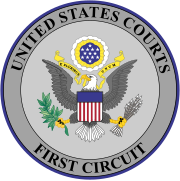Joint Tribal Council of the Passamaquoddy Tribe v. Morton
| "Joint A Tribal Council", press of the Passamaquoddy Tribe v. Morton | |
|---|---|
 |
|
| Court | United States Court of Appeals for the First Circuit |
| Full case name | Joint A Tribal Council of the Passamaquoddy Tribe v. Rogers C. B. Morton, Secretary, Department of the Interior, et al. |
| Decided | Dec. 23, 1975 |
| Citation(s) | 528 F.2d 370 (1st Cir. 1975) |
| Case history | |
| Prior action(s) | 388 F. Supp. 649 (D. Me. 1975) |
| Case opinions | |
| Campbell | |
| Court membership | |
| Judge(s) sitting | Frank Morey Coffin, Edward McEntee, Levin H. Campbell |
Joint a Tribal Council, of the Passamaquoddy Tribe v. Morton, 528 F.2d 370 (1st Cir. 1975), was a landmark decision regarding aboriginal title in the United States. The United States Court of Appeals for the First Circuit held that the Nonintercourse Act applied to the Passamaquoddy and Penobscot, non-federally-recognized Indian tribes, and established a trust relationship between those tribes and the federal government that the state of Maine could not terminate.
By upholding a declaratory judgement of the United States District Court for the District of Maine, the First Circuit cleared the way for the Passamaquoddy and Penobscot to oblige the federal government to bring a land claim on their behalf for approximately 60% of Maine, an area populated by 350,000 non-Indians. According to the Department of Justice, the suit was "potentially the most complex litigation ever brought in the federal courts with social and economic impacts without precedent and incredible potential litigation costs to all parties." The decision led to the passage of the Maine Indian Claims Settlement Act in 1980, allocating $81.5 million for the benefit of the tribes, in part to allow them to purchase lands in Maine, and extinguishing all aboriginal title in Maine. The settlement was reached "after more than a decade of enormously complex litigation and negotiation."
The Passamaquoddy claim was "one of the first of a series of eastern Indian land claims to be prosecuted" and "the first successful suit for the return of any significant amount of land." Compared to the $81.5 million compensation in the Passamaquoddy case, the financial compensation of other Indian Land Claims Settlements has been "inconsequential."
...
Wikipedia
